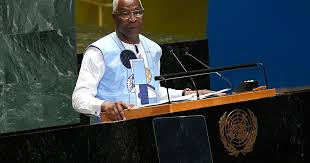
Guinea has entered a decisive phase in its political transition after the Supreme Court formally validated the results of the country’s constitutional referendum, paving the way for presidential elections on 28 December 2025.
In a decree broadcast on national television, transitional president General Mamadi Doumbouya confirmed the date of the vote and instructed the Ministry of Territorial Administration and Decentralisation, through the General Directorate of Elections, to take all necessary measures to ensure the timetable is met.
He also promulgated the new Electoral Code adopted on 26 September.
The Supreme Court’s proclamation on Saturday confirmed figures previously announced by the Minister of Territorial Administration, Ibrahima Kalil Condé, who had declared the draft constitution “provisionally adopted” earlier in the week.
According to the final tally, out of 6,768,458 registered voters, 5,951,807 participated in the referendum held on 21 September, representing a turnout of 86.42%. Of the 5,746,327 valid votes cast, 5,135,951 supported the new constitution, accounting for 89.38%. A total of 610,376 people, or 10.62%, voted against.
The adoption of the new Basic Law marks a turning point for Guinea. Drafted by the National Transitional Council (NTC) and submitted to General Doumbouya in June, the constitution establishes a seven-year presidential term renewable once, introduces the creation of a Senate, and allows the current head of state to run in the forthcoming election.
By confirming the results, the country’s highest court has ended speculation about the legitimacy of the referendum, clearing the path for the December poll. The dual decrees read on national television underscored the transitional leadership’s commitment to guiding the nation toward constitutional order after years of political turbulence.
Observers say the coming months will test Guinea’s ability to uphold both the spirit and the letter of its new constitution, as political actors prepare for a landmark election that could define the country’s democratic future.



